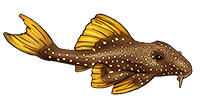Teach wild otocinclus to eat using another species?
-
SwevenWonders
- Posts: 7
- Joined: 11 May 2023, 01:15
- My cats species list: 3 (i:2, k:3)
- My aquaria list: 3 (i:0)
- My BLogs: 3 (i:4, p:64)
- My Wishlist: 4
- Spotted: 6
- Location 1: Montreal
- Location 2: Canada
Teach wild otocinclus to eat using another species?
I have recently aquired some bumblebee otocinclus and am having trouble switching them to human given food. Thus far they are only eating natural grown algae. Their 29gal tank was basically a giant algae box a week ago when I put the 12 bumblebees in there, but natural algae doesnt last forever. I have tried repashy, mulberry leaves, and boiled zuchini so far, but nothing seems interesting to them.
I was considering putting one of my baby otocinclus vittatus in the aquarium with them. I have all ages and could pick one close to their size. My baby vittatus were born here and are very good eaters of basically anything. I would then take the baby out of the tank in a couple months.
Is there any reason that this would not be a good idea? Or maybe there is a better way to get the bumblebees to consider human given food?
I was considering putting one of my baby otocinclus vittatus in the aquarium with them. I have all ages and could pick one close to their size. My baby vittatus were born here and are very good eaters of basically anything. I would then take the baby out of the tank in a couple months.
Is there any reason that this would not be a good idea? Or maybe there is a better way to get the bumblebees to consider human given food?
-
dw1305
- Posts: 1101
- Joined: 22 Oct 2009, 11:57
- Location 1: Corsham, UK
- Location 2: Bath, UK
- Interests: Natural History, Ecology, Plants, Biotopes, Taxonomy, Nitrification, Cricket & Northern Soul
Re: Teach wild otocinclus to eat using another species?
Hi all,
I think (@apistomaster)* has a thread somewhere under one of their former names <"https://www.scotcat.com/loricariidae/rhinotocinclus_isabelae.htm">.
*Found it <"https://www.planetcatfish.com/forum/viewtopic.php?p=335734">.
cheers Darrel
I'd try it and see what happens. I'm surprised they haven't tried Repashy or Zucchini, but assuming they are these ? I think they are problematic to keep in the long term.SwevenWonders wrote: 01 Jan 2024, 23:37 I have recently aquired some bumblebee otocinclus and am having trouble switching them to human given food..... I have tried repashy, mulberry leaves, and boiled zuchini so far, but nothing seems interesting to them.
I was considering putting one of my baby otocinclus vittatus in the aquarium with them. I have all ages and could pick one close to their size. My baby vittatus were born here and are very good eaters of basically anything. I would then take the baby out of the tank in a couple months.
I think (@apistomaster)* has a thread somewhere under one of their former names <"https://www.scotcat.com/loricariidae/rhinotocinclus_isabelae.htm">.
*Found it <"https://www.planetcatfish.com/forum/viewtopic.php?p=335734">.
cheers Darrel
-
SwevenWonders
- Posts: 7
- Joined: 11 May 2023, 01:15
- My cats species list: 3 (i:2, k:3)
- My aquaria list: 3 (i:0)
- My BLogs: 3 (i:4, p:64)
- My Wishlist: 4
- Spotted: 6
- Location 1: Montreal
- Location 2: Canada
Re: Teach wild otocinclus to eat using another species?
Thanks for the reply and the thread, it was a good read. The baby is in their tank now so I just have to wait for them to learn food. There is LOT of algae still in the tank (all four walls were coated when they went in) so maybe they havent felt the need to switch yet.
- apistomaster
- Posts: 4735
- Joined: 10 Jun 2006, 14:26
- I've donated: $90.00!
- My articles: 1
- My cats species list: 12 (i:0, k:0)
- My Wishlist: 1
- Location 1: Clarkston, WA, USA
- Location 2: Clarkston, WA, USA
- Interests: Aquaculture and flyfishing
Re: Teach wild otocinclus to eat using another species?
I think it's a good idea to have similar species which are already well adapted and eating.
I do suspect we have much to learn about the husbandry of some of these lesser known "micro-loricaridae." My impression is that they are specialists which are adapted to narrow ecological niches. Still, they are probably detritivores and eat any small foods found on waterlogged wood. That could mean everything from aquatic invertebrates, their eggs, diatoms, algae and WHY..
High dissolved O2 levels in their water is likely essential. If I had any again, I'd probably keep a supply of decaying Indian Almond leaves in their tank They seem to be a versatile addition to tanks dedicated to soft acid water fish tanks.
These are just so rambling thoughts of a nowadays mostly armchair
aquarist.
I do suspect we have much to learn about the husbandry of some of these lesser known "micro-loricaridae." My impression is that they are specialists which are adapted to narrow ecological niches. Still, they are probably detritivores and eat any small foods found on waterlogged wood. That could mean everything from aquatic invertebrates, their eggs, diatoms, algae and WHY..
High dissolved O2 levels in their water is likely essential. If I had any again, I'd probably keep a supply of decaying Indian Almond leaves in their tank They seem to be a versatile addition to tanks dedicated to soft acid water fish tanks.
These are just so rambling thoughts of a nowadays mostly armchair
aquarist.
Avid Trout fly fisherman. ·´¯`·...¸><)))º>





